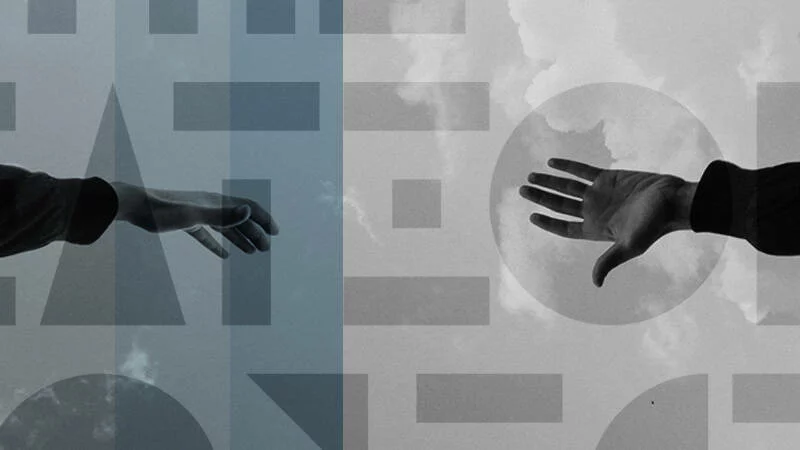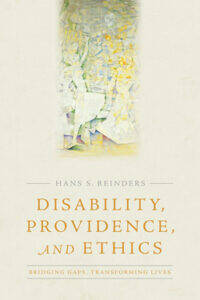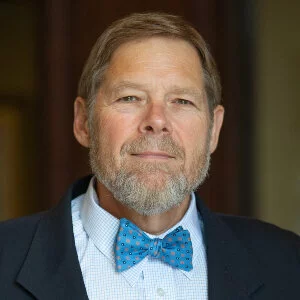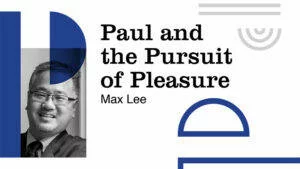The problem of evil and the mystery of divine providence are deep existential issues. Even among those who do not believe in God, the tendency of the human spirit is to look for reasons for “why bad things happen to good people,” to quote the title of a best-seller on the subject. In most people’s minds, disability is one of those bad things. For example, Jesus’s disciples had to be disabused of the opinion that disability was an act of God’s judgment. When they encountered a man with congenital blindness they asked Jesus “who sinned, this man or his parents, that he was born blind?” (John 9:2).
In their minds, the problem of evil was solved by a rather simplistic version of the free will argument. Bad things happened, they reasoned, because individuals had done bad things. Jesus, as he always does, complicates their world by offering another perspective on the matter. “It was not that this man sinned,” he said, “or his parents,” for that matter, “but that the works of God might be displayed in him” (John 9:3).
Recent Work on Disability
Recent work on the theology of disability has challenged the simplistic, but mistaken, notion that disability is a positive evil. Jean Vanier, the Canadian-born Catholic theologian who passed away in May 2019, was an advocate for persons with disabilities and founded L’Arche in 1964, an international movement of communities for the people with developmental disabilities.
Well known Protestant theologian Stanley Hauerwas has been a voice for the disabled for most of his career, publishing in 1982, Responsibility for Devalued Persons: Ethical Interactions Between Society, Family, and the Retarded (Charles C. Thomas Publishers) and in 1986, Suffering Presence: Theological Reflections on Medicine, the Mentally Handicapped, and the Church (University of Notre Dame Press).
Another late twentieth-century voice on the subject was Robert Perske, who for more than a decade served as chaplain at the Kansas Neurological Institute pastoring 250 children and youth with intellectual disabilities.http://www.robertperske.com/Index.html Perske challenges us to think about disability from a different perspective than the simplistic vantage point of Jesus’s disciples. In an essay titled, “The Theological Views of Some of My Retarded Friends,” Perske offers the example of a 15 year-old’s question to her parents about heaven. “Will I be retarded when I get to heaven?” she asked. The parents answered that she would not, because “there would be no sickness, no pain. Everyone would be perfect.” To this she replied, “But, how will you know me then?”First published in Pastoral Psychology, 1971, Vol. 22, No. 219 and reprinted in William C. Gaventa and David Coulter (eds), The Pastoral Voice of Robert Perske, (Routledge, 2003), 132.
Amos Yong’s, Theology and Down Syndrome: Reimagining Disability in Late Modernity (Baylor University Press, 2007), and his The Bible, Disability, and the Church: A New Vision for the People of God (Eerdmans, 2011) are two prime examples of a serious evangelical attempt to understand disability in light of the biblical witness and his own experience with his brother, Mark, who was born with Down Syndrome.
Asking Questions, Telling Stories
More recently, Hans Reinders, Professor of Ethics at Vrije Universiteit located in Amsterdam, The Netherlands, has contributed to the conversation Disability, Providence, and Ethics: Bridging Gaps, Transforming Lives (Baylor University Press, 2014). He is also the author of The Future of the Disabled in Liberal Society: An Ethical Analysis (University of Notre Dame Press, 2000) and Receiving the Gift of Friendship: Profound Disability, Theological Anthropology, and Ethics (Eerdmans, 2008).
These stories, and others Reinders reports, offer a thicker description of the phenomena of disability than many readers might know. Taken together, these stories are powerfully illuminating.
The question Reinders poses in Disability, Providence, and Ethics is whether thinking theologically about providence can “empower people to face the contingencies of living with adversity” (p. 21)—like congenital disabilities and traumatic brain injury—and, if so, how? Or as he puts the question early in the book, “what does theological explanation have to say to people with disabilities that does not set them apart from the rest of humanity?” (p. 13).
On the way to answering those questions, Reinders offers some stunningly helpful insights. For instance, the heart of the task of reflecting theologically about disability begins with listening to people’s stories. If one were studying a text this would be the process of exegesis, reading and hearing the text as it is written. This exercise, he argues, will help so-called normal people avoid the sin of “ableism,” a lens through which “normal” people often see “abnormal” people as “us” versus “them.” To that end Reinders offers the account of Adam, as told by Martha Beck in her book, Expecting Adam, that reports what happened to her and her husband, John, when they were told that their son, Adam, would be born with Down Syndrome. Over time, their perspectives on disability were completely transformed in unanticipated ways.
Another biographical account is found in Cathy Crimmins’s Where Is the Mango Princess? In that book, Crimmins tells the story of her husband’s traumatic brain injury and the way it profoundly altered her husband Al’s personality, so that she ends up lamenting the loss of the husband she once knew. And as one might anticipate, the story of the biblical character, Job, is also told. These stories, and others Reinders reports, offer a thicker description of the phenomena of disability than many readers might know. Taken together, these stories are powerfully illuminating.
Calvin, Barth, and Theodicy
The final chapters of the book are properly theological, focusing on the work of Calvin and Barth and their theologies of providence. Although he is critical of what Arne Rasmusson has called “cheap theodicies,” one worries that the cure is worse than the disease.https://www.firstthings.com/article/2015/06/hearts-knowledge At the end of the day, says Reinders, “Understanding providence, therefore, is not about trying to figure out why God sends these events upon you rather than others” (p. 181). This seems to be helpful pastoral counsel. But he furthermore argues that “the belief in divine providence is harmful when it is taken to mean that all is well that ends well” (p. 181). Likewise helpful pastoral counsel, up to a point. Although, to be sure, one should not cavalierly rush to quote Romans 8:28, the fact remains that as the apostle Paul wrote under inspiration of the Spirit, “we know that for those who love God all things [do] work together for good, for those who are called according to his purpose.” Or as the hymn writer William Cowper who suffered from severe bouts with melancholy and suicidal thoughts put it in “God Moves in a Mysterious Way,”
Ye fearful saints, fresh courage take;
The clouds ye so much dread
Are big with mercy and shall break
In blessings on your head.
Judge not the Lord by feeble sense,
But trust Him for His grace;
Behind a frowning providence
He hides a smiling face.
Reinders’s view of providence calls on readers not to point sufferers to some future good but to see the Spirit as the one who will bridge the gap between past and future in the midst of affliction. In other words, providence is not about God’s work behind the scenes to accomplish his future good purposes for his creatures, but “is the active presence of God, mediated by the Spirit, to guide us in learning to see the new life that is around us, and is there is to be seen” (p. 190). Providence provides an opportunity to transform one’s perceptions of the world and of disability.
Preserving Providence
Again, although these are very helpful reminders, one is left with the impression that God may not know the end from the beginning, that he is not aware of the contingencies of the future, but by his Spirit only laments with us when “bad things happen.” “Providence,” in Reinders’s view, “is not about God’s being causally in control of the universe . . . Instead it is about his Trinitarian presence to sustain the promise that he will not abandon his creation” (p. 28). Why can’t providence be both? Yes, the existential experience of adversity is first addressed by the felt presence of the Spirit of God, often mediated through the presence of others. Yet at the same time isn’t that comfort ultimately grounded in the reality that God knows what he’s doing, as it were? My wife can lament with me and travel with me “through the valley of the shadow of death.”That the loving sovereign God is superintending his creation and his creatures is not foreboding but life-giving. And her compassionate presence is comforting indeed. But I also want to know—I need to know—that behind those adversities God’s “goodness and mercy shall follow me all the days of my life, and I shall dwell in the house of the Lord forever” (Psalm 23:4, 6). The adversity must have a purpose if it is to be endured with hopefulness.
The story is told as true of a wife and mother who lost her husband and son to a small plane crash. One Sunday a church member spied a piece of paper on the pew near the woman. The slip of paper said, “God must really trust you to bear this burden for his glory.” The church member was furious and replied to the woman, “How dare the person who wrote this blame God for the plane crash! My God had nothing to do with that!” The widow responded, “well, if God had nothing to do with it, I have no hope. I might as well blow my brains out.” That the loving sovereign God is superintending his creation and his creatures is not foreboding but life-giving.
Thankfully, when God took on the limitations of human flesh, and in the person of Christ was crucified on Calvary’s cross, he identified with all our sins and our disabilities. He became, in a real sense and for our salvation, what the late disability activist Nancy Eiesland calls in her book of the same title, The Disabled God. But, a God who does not and cannot superintend our adversities of the present for the benefit of our future is disabled in another, more theologically troubling, way.








Comments
Be the first one to make a comment!